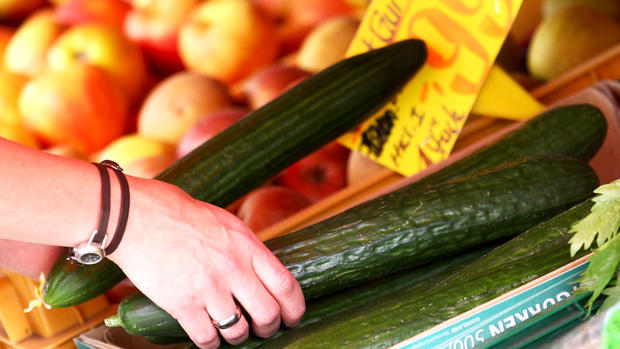Tests zero in on source of E. coli in Costco chicken salad
SEATTLE -- Testing has pointed toward a vegetable mix from a California food wholesaler as the source of E. coli in Costco chicken salad that has been linked to an outbreak that has sickened 19 people in seven states, a Costco official said Wednesday.
Craig Wilson, Costco vice president of food safety and quality assurance, said he was told by the Food and Drug Administration that the strain of E. coli seems to be connected to an onion and celery mix.
The company uses one supplier for those vegetables in the chicken salad sold in all its U.S. stores, Wilson said.
One additional test is needed to confirm that the vegetables carried the same E. coli strain connected with the outbreak, he said.
Wilson identified the supplier as Taylor Farms in Salinas, California.
Phone calls to the company did not get answered on Wednesday afternoon. A message left with the FDA was not immediately returned.
The number of people sickened in the outbreak will likely grow over the next few weeks, even though the product has been removed from store shelves, the federal Centers for Disease Control and Prevention said earlier in the day.
The spread of foodborne illness takes time to track, especially when it's happening in multiple states, said Dr. Robert Tauxe, deputy director of the CDC's Division of Foodborne, Waterborne and Environmental Diseases.
State health officials, particularly those in Utah, discovered the outbreak and helped find links between the 19 illnesses in seven states, Tauxe said.
"Very quickly they noticed these people did have something in common. They really liked and ate the rotisserie chicken salad," he said.
The big-box retailer based in Issaquah, Washington, pulled the chicken salad off store shelves nationwide, posted signs in its stores and provided detailed purchase logs to the CDC to help it track who bought the product and where the salad ingredients came from, Tauxe said.
Costco is working closely with the CDC, FDA and local health officials to find the source of the E. coli and has encouraged its suppliers to do the same, Wilson said.
"We feel terrible about the people who got sick," he said.
The strain of Shiga toxin-producing E. coli can be life-threatening, but no deaths have been reported. Five people have been hospitalized, including two with kidney failure. The CDC has been told they are all getting better, Tauxe said.
The CDC has identified a DNA fingerprint of the E. coli strain connecting all 19 patients. As health departments get more reports of foodborne illness, additional people will be checked for the fingerprint and the case count will likely rise, Tauxe said.
"All the evidence that we have points to this chicken salad," he said.
Tauxe emphasized that the agency does not have any evidence that other Costco food was contaminated.
Wilson said chickens have not been connected to the outbreak, and no other Costco products use the same other ingredients found in the chicken salad.
"We're pretty confident the path that everyone seems to be on is correct," he said.
Investigators were testing food removed from the stores, including chicken salad and other products, and talking to those who have gotten sick. All but two have reported eating the chicken salad made and sold by the retailer.
Six people got sick in Montana, five in Utah, four in Colorado, and one each in California, Missouri, Virginia and Washington state. The CDC said the illness reports began on Oct. 6 and involved people from age 5 to 84.
Health officials urged people who bought chicken salad at any U.S. Costco store on or before Nov. 20 to throw it away, even if no one has gotten sick.
The Costco-linked illnesses are not related to a recent E. coli outbreak tied to Chipotle that sickened more than 40 people. Chipotle voluntarily closed 43 restaurants in Washington and Oregon and reopened them after deep cleaning and ordering new ingredients.
Tauxe said both investigations are ongoing and he hopes they will eventually find the exact cause of both outbreaks.
"I think we're going to learn something important from both ultimately," he said.
Symptoms of E. coli infection include diarrhea, abdominal cramps, nausea and vomiting. The incubation period is three to seven days from the time of exposure.
Health officials urge anyone with the symptoms, especially people who have eaten Costco chicken salad, to go to their doctor.

